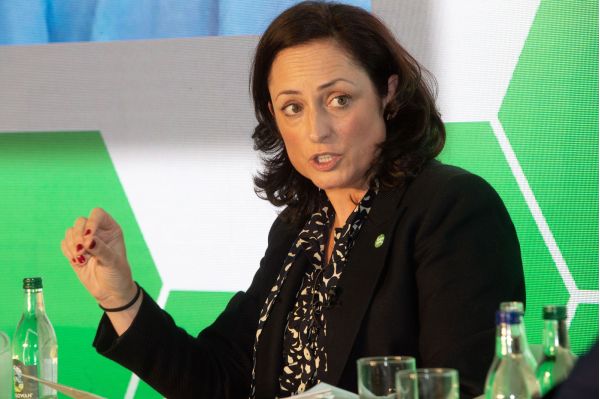Making connections

The meat sector in Ireland, from farm through to processing and export, is one of the most important indigenous industries to the national economy. The sector is a critical and valuable contributor to the national economy in terms of economic and social activity. Margaret explains: “The Irish meat sector has come a long way from a frozen commodity business into a top-10 net beef exporter, globally. Thanks to our industry stakeholders we have been able to build a strong reputation for safe, high-quality and sustainable food on an enviable grass-based production system.”
The potential for further growth exists, she adds, however sustainability requires a full supply-chain effort. “As processors, our position in the supply chain gives us some visibility of what is happening both up and downstream. We can see that our role, like so many others along the supply chain, is evolving and we must evolve with it. At Kepak, many of our customers are focussed on building a roadmap for their business on how they will meet their ambitious sustainability targets. The sustainability conversation is broadening with the rise of sustainability-reporting regulation calling on companies to disclose more about their sustainability and environmental, social and governance (ESG) strategy across their entire business.”
Margaret notes that being at the end of a long and complex supply chain creates a huge challenge for B2B customers, for example. “They cannot act on sustainability in a meaningful way without suppliers and manufacturers acting, too. For example, up to 95 per cent of greenhouse gas emissions in retail are Scope 3 indirect emissions that retailers can’t tackle without the help of upstream and downstream supply chain partners. They want to see a shared ambition and verifiable data from the supply chain to support sustainability claims. They also need to be educated about agriculture.”
Twenty20 Beef programme
Kepak’s founder, Noel Keating, recognised the critical importance of remaining directly connected with farmers and livestock suppliers, Margaret said. “That philosophy remains true to this day. It is from this foundation that we have developed several innovative producer programmes with a multilateral stakeholder approach to address the needs of stakeholders in the supply chain and the changing market requirements. The most recent iteration is the Twenty20 Beef Club, which is a strategic collaboration between Kepak and Tirlán, launched in 2019. This initiative was designed to work closely with producers, providing them with a blueprint that covers the husbandry of the animal from birth to finish and supporting them through a technical support team. It offers a closed loop, fully integrated, high-quality beef supply chain with unrivalled traceability. The club’s vision has sustainability at its core, creating both financial and environmental value for the producer, while delivering a more sustainable beef product for the evolving B2B customer and market needs.”
To date, there are over 1,500 signed up farmers supplying calves or finished cattle through the club; 30,000 club cattle have been processed to date, with a further 60,000 cattle in the system for processing over the next 18 months. And, according to Margaret, farmer membership continues to grow year-on-year. “It is through this type of close collaboration with our producers that we are better able to support and progress the economic and environmental dimensions of sustainability in our supply chain while at the same time helping our customers to reach their climate goals.”
There are several other ways this collaboration brings real value to its members, Margaret said, including: bringing certainty to producers; knowledge transfer and technical support; increased resilience of the supply chain; and reducing risk.
“We can see that our business model in the future will include more integrated supply chains and this will be a key component to linking the producer and the consumer. With the conversation on sustainability expanding quickly beyond emission reductions to include topics like nature and biodiversity, closed loop integrated supply chains will be integral to customer engagement and, in time, consumer purchase decisions.”
Access to data and technology
Margaret explained that access to quality technology and data is fundamental to linking the producer with the consumer. “As processors we know that in the period to 2030, quality data measure, capture and monitor techniques will be critical to the success of the sector. This will be the virtual thread that will connect the producer with the consumer. Providing transparency along the food chain and most critically allow us to capture, with evidence, our producers positive environmental impact.
“At Kepak, along with our peers, we know that the primary producers are fundamental to Ireland’s vision to becoming a world leader in sustainable food systems. Their economic viability is crucial not only for their livelihoods but also in helping to deliver on environmental and social sustainability of the sector. A lot has been asked of them already and, there will be more asked of them, of all of us.
“We are in the enviable position in Ireland to have a unique ecosystem of interconnected stakeholders who continuously work together supporting the industry to produce safe, high-quality food in a sustainable way contributing to vibrant rural communities and the national economy. While the term ecosystem is not a new idea, the realisation of the true interconnectedness of Ireland’s agri-food ecosystem is where we can achieve our true potential.”
Kepak has 13 manufacturing plants in Ireland and the UK. The company has over 4,500 employees and a presence in 43 countries. The company works with over 21,000 farms and farming families through fair trade, knowledge transfer and sustainability initiatives.





